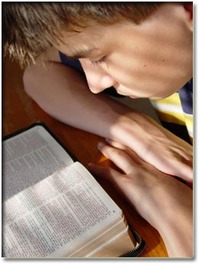In the Apostolic
Exhortation Verbum Domini released today, I immediately started reading the
document for what the Pope had to say about lectio divina. You may recall the Pope's remarks for the 40th anniversary of Dei Verbum in 2005, he said lectio divina will bring about a spiritual springtime in Church. His words were:
"the diligent reading of Sacred Scripture accompanied by prayer brings about that intimate dialogue in which the person reading hears God who is speaking, and in praying, responds to him with trusting openness of heart (cf. Dei Verbum, 25). If it is effectively promoted, this practice will bring to the Church --I am convinced of it-- a new spiritual springtime."
No less than 16 times does His Holiness
use the words lectio divina.
Here are some points of interest in Verbum Domini regarding lectio:
 46. Listening together to the word of God, engaging in
biblical lectio divina, letting ourselves be struck by the
inexhaustible freshness of God's word which never grows old, overcoming our
deafness to those words that do not fit our own opinions or prejudices,
listening and studying within the communion of the believers of every age: all
these things represent a way of coming to unity in faith as a response to
hearing the word of God.
46. Listening together to the word of God, engaging in
biblical lectio divina, letting ourselves be struck by the
inexhaustible freshness of God's word which never grows old, overcoming our
deafness to those words that do not fit our own opinions or prejudices,
listening and studying within the communion of the believers of every age: all
these things represent a way of coming to unity in faith as a response to
hearing the word of God.
48. The interpretation of sacred Scripture would
remain incomplete were it not to include listening to those who have truly
lived the word of God: namely, the saints. Indeed, "viva
lectio est vita bonorum." The most profound interpretation
of Scripture comes precisely from those who let themselves be shaped by the
word of God through listening, reading and assiduous meditation. It is
certainly not by chance that the great currents of spirituality in the Church's
history originated with an explicit reference to Scripture.
82. Those aspiring
to the ministerial priesthood are called to a profound personal relationship
with God's word, particularly in lectio divina,
so that this relationship will in turn nurture their vocation: it is in the
light and strength of God's word that one's specific vocation can be discerned
and appreciated, loved and followed, and one's proper mission carried out, by
nourishing the heart with thoughts of God, so that faith, as our response to
the word, may become a new criterion for judging and evaluating persons and
things, events and issues. Such attention to the prayerful reading of Scripture
must not in any way lead to a dichotomy with regard to the exegetical studies which
are a part of formation. The Synod recommended that seminarians be concretely
helped to see the relationship between biblical studies and scriptural
prayer.

86. The Synod frequently insisted on the need for a
prayerful approach to the sacred text as a fundamental element in the spiritual
life of every believer, in the various ministries and states in life, with
particular reference to lectio divina.
Devote yourself to the
lectio of the divine Scriptures; apply yourself to this with
perseverance. Do your reading with the intent of believing in and pleasing God.
If during the lectio you encounter a closed door, knock
and it will be opened to you by that guardian of whom Jesus said, 'The gatekeeper
will open it for him.' By applying yourself in this way to lectio divina,
search diligently and with unshakable trust in God for the meaning of the
divine Scriptures, which is hidden in great fullness within.
For this reason, the
privileged place for the prayerful reading of sacred Scripture is the
liturgy, and particularly the Eucharist,
in which, as we celebrate the Body and Blood of Christ in the sacrament, the
word itself is present and at work in our midst. In some sense the prayerful
reading of the Bible, personal and communal, must always be related to the
Eucharistic celebration. Just as the adoration of the Eucharist prepares for,
accompanies and follows the liturgy of the Eucharist, so too prayerful reading,
personal and communal, prepares for, accompanies and deepens what the Church
celebrates when she proclaims the word in a liturgical setting. By so closely
relating lectio and liturgy, we can better grasp the criteria which should
guide this practice in the area of pastoral care and in the spiritual life of
the People of God.
87. The documents produced before and during the Synod
mentioned a number of methods for a faith-filled and fruitful approach to sacred
Scripture. Yet the greatest attention was paid to lectio divina,
which is truly "capable of opening up to the faithful the treasures of God's
word, but also of bringing about an encounter with Christ, the living word of
God."
 46. Listening together to the word of God, engaging in
biblical lectio divina, letting ourselves be struck by the
inexhaustible freshness of God's word which never grows old, overcoming our
deafness to those words that do not fit our own opinions or prejudices,
listening and studying within the communion of the believers of every age: all
these things represent a way of coming to unity in faith as a response to
hearing the word of God.
46. Listening together to the word of God, engaging in
biblical lectio divina, letting ourselves be struck by the
inexhaustible freshness of God's word which never grows old, overcoming our
deafness to those words that do not fit our own opinions or prejudices,
listening and studying within the communion of the believers of every age: all
these things represent a way of coming to unity in faith as a response to
hearing the word of God.


Paul, you know that no one really needs any doors opened for them. On the contrary, the faithful soul sooner or later learns that it is the Lord himself who stands outside the door. As he says: "Ecce sto at ostium et pulso; si quis audierit vocem meam et aperuerit ianuam, intrabo ad illum et cenabo cum illo, et ipse meum."
He is reading our hearts even as we search his lectionem divinam for signs of his love.
Tom
Tom, Many souls need to be reminded that the door is always open to them, even held open by the gate keeeper, as the Holy Father pointed out. I think may have St Bernard who wrote, "O soul, I am standing at the door of your heart, knocking... Let me come in. If you open the door I will come in, to make my home heart?"
PAX,
PAZ